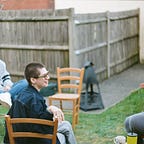Reflections Of A Recovered Anorexic: Eating disorders are a symptom of capitalist realism
It was Mark Fisher who said “If every individual’s mental illness is solely the result of anomalous brain chemistry, not induced or augmented by factors such as financial precarity or social isolation or neoliberal perfectionism, then we need not inquire whether our society itself is disordered.”
So long, Fisher says, as we continue to tackle mental illness as a phenomenon of the individual, the system continues to function in the way it was designed to: it bolsters the privileged and stifles the oppressed. It drives consumerism. It survives on endless growth, meaningless expansion, and it becomes more and more un-changeable.
I was nine years old and exploding at the dinner table. A little Oppenheimer, unleashing upon my family something no one is equipt to deal with. I misunderstood what was happening to me. I am twenty now and slightly wiser. At the time, it was about food. Now I understand it was all about control.
Eating disorders are funny manifestations of chaos and uncertainty. They are illogical. They are a civil war. Unrelenting, and deadly.
I am extremely privilleged. I had treatment and special consideration was given to me due to my age. At the time I was an anomaly. I fear now I would be considered part of a larger and ever-growing group of children with eating disorders.
For me, growing up has meant realising most of my peers have eating disorders. I have been through treatment twice. I have had countless therapists and therapies. I know my illness. And I see it in almost everyone.
Mostly, I see iterations of it teetering on the edge of severity. I see people functioning well enough to live ‘normally’. I see it the gym boys posting body checks every month. The keto diet. Friends going vegan. Friends who have ‘cheat days’. MyFitnessPal. Those who exercise every single day. Not eating before going out drinking. Labelling foods as good and bad. ‘Making up’ for ‘being bad’. Waist trainers. It truly does come in all shapes and sizes.
Many people have drawn the link between social media and body-image. Before social media, it was magazines, movie stars, photoshop. Now it’s all that but delivered to us first thing in the morning and everyone can edit themselves. I think this is true but uninspiring. It’s not instagram that is the problem. Facetune and social media comparison is a symptom of something much more powerful.
The term ‘Hypernormalisation’ comes to mind: ‘Everyone in my country and in America and throughout Europe knows that the system that they are living under isn’t working as it is supposed to; that there is a lot of corruption at the top. But when ever the journalists point it out, everyone goes “Wow that’s terrible!” and then nothing happens and the system remains the same.’ (Adam Curtis).
When this happens, real change becomes intangible. The effects of the people’s voice seem minimal. Change that is effected seem mere efforts from those higher up to pacify those resisting. Hannah Arendt was right when she suggested mans political activity has been stripped from him. We work while our representatives fight for their interests. We want to change politics but none of us have a foot in the door.
In times like these, when the world spins out of control, we turn inwards. We flounder. We grasp at anything in efforts to regain control.
The one thing we have control over is our bodies.
We ration pleasure. We militarize rules. And we are left with generations of people who don’t know how to eat without feeling guilty. Who don’t know how to listen to their body. Who’s body image is forever damaged. Who salvage control in excessive exercise.
Paired with the system we feel helpless within, that pushes consumerism, commodifies bodies, commodifies wellness, commodifies health and fitness, we are victims of multiple types of sickness. The individual consumes everything but what’s healthy. The individual retreats further inwards. The machine roars. Capitalism propogates. The individual no longer grapples for control in a political world. They have found something they can fit their two hands around. And they’ll buy anything that let’s them keep it that way.
Individualism is a sickness, too. The systems we exist under that perpetuate the lie ‘it’s all in your head’. There is more to be done on the mental health front. And it entails a dismantling of the capitalist world.
